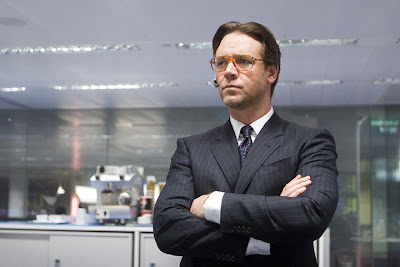Yes, this is another romantic comedy. With my current travels to see family in Florida this week, I'm dipping into the film reserve I've gathered on DVD of late, the same batch from which last week's
You've Got Mail was a part. Once again I can thank my friend Anne for her suggestions, though I'm sure my readers will like me to move onto more varied fare, such as the R-rated comedy
Horrible Bosses or the final
Harry Potter film. There is no time to see new movies this week, however, so for now I'm afraid you'll have to settle for me lecturing you on a film you perhaps should have seen but didn't. This is hardly a surprise; despite his name recognition, Russell Crowe has never been the box office hero you might have imagined. In reality, he's much more well known for his quick temper and bad-boy attitude than his actual acting talent, which is unfortunate since he has in my eye proven himself to be quite the strong performer. With the notable exceptions of titles
Gladiator and
A Beautiful Mind (and maybe
LA Confidential), Crowe's films can be categorized two ways: either they are so costly that they fail to recoup expenses despite good efforts (
Robin Hood,
Master & Commander: The Far Side of the World), or they are inexpensive flops that limp out of the gate.
A Good Year was Crowe's first collaboration with director Ridley Scott after the cinema juggernaut that was
2000's
Gladiator, a pairing that has often been spoken among the more legendary actor/director partnerships in Hollywood history (whether deservedly or not). Based on the bestselling novel by Peter Mayle,
A Good Year should have garnered some support from audiences, but for whatever reason they were absent, leading insiders to call it a flop mere days after the film's release. It was an unfortunate failure for Scott and Crowe, but one that might have been simply undervalued not only by audiences, but by the very production studios that pushed this film.
 |
| I'm not sure you should be trusting your money with this man... |
When hard-nosed London investment trader Max Skinner (Crowe) learns that his uncle Henry (Albert Finney) has passed away leaving Max the sole beneficiary of a vineyard estate in Provence, his first instinct is to sell the land. After all, Max has no use for a summer home when he hasn't taken day off from work for years, worrying about being usurped in his absence. After all, that's what he did to his predecessor. However, a suspension from his job for shady business practices forces him to at least visit his new property before selling it. While the estate could use a serious makeover, Max ends up nostalgic for the childhood spent there with his uncle, though not enough to reconsider his decision to sell. This creates conflict on several fronts, however; the land's chief winemaker Francis (Didier Bourdon) is adamant that Henry didn't entrust the estate to his nephew just so he could sell it off. And the sudden arrival of Christie (Abbie Cornish), claiming to be Henry's long-lost American daughter, threatens Max's sale of the vineyard by contesting his ownership. Finally, Max falls for a local cafe owner named Fanny (Marion Cotillard), who has supposedly sworn off men while becoming irresistable to Max. The reigning question becomes whether Max will sell the French vineyard, and if so whether he could possibly be redeemable afterwards.
 |
| "And if you look even farther, you'll see when Mr. Anderson DOESN'T review RomComs..." |
For a film with such a high-profile star and director, problems have no shortage. Flashbacks to a young Max hanging out with his uncle Henry feel almost out of place against the backdrop that is the rest of the film, but unfortunately they are also important to the main tale and therefore cannot be ignored. This means that the scenes in which you are least interested are among the most needed to understanding what exactly is going on, a sad happenstance that reflects poorly on the quality of the script. Humor is also somewhat lacking. While many of the verbal quips are good enough for a nice chuckle, too often does
A Good Year rely on slapstick and physical comedy to reach out to the audience, often to little positive effect. The romance itself, necessary for a film claiming to be a romantic comedy, is all but ignored until the film's final act, as the main focus until then seems to be on Max's nostalgia, the least interesting aspect of the entire story.
 |
| Apparently this is what passes for extremely funny in France |
The film does have numerous strengths to assist in its cause, however. The script does have that charm that truly great actors can take advantage of, and I've seen no better use of Russell Crowe than his transformation from emotionless trader to charming romantic. Crowe's Max plays well through the first two-thirds of the movie in a performance that takes somewhat from earlier work thugs, malcontents and ne'er-do-wells, but with an easy charm that never lets you dislike him as we all did in
LA Confidential. That charm really comes out to play when the romance with Fanny is (
FINALLY!) explored later on. Until then we're happy to see him frolick verbally with costars Bourdon, Cornish and Archie Punjabi, who plays his personal assistant, matching him word for word. Looking back, it would be easy to say that Crowe is playing against type in
A Good Year, but here is one of the few times that I think Crowe was most comfortable in a role, not playing to his usual thuggish ways.
 |
| Those Gladiator royalty checks didn't go as far as he thought... |
The rest of the cast is also quite good, a sign that Scott had at least an idea what he was doing in that department. Finney is excellent despite being nearly relegated to the duller portions of the film, with Henry's paternal instincts in regards to Max coming through quite nicely. Sure, Finney amounts to little more than a scene-chewer (and with only young Freddie Highmore ever playing against him, he needs to), but he does it extremely well. This was Australian Cornish's first Hollywood role, and though it comes well before her beloved performance in
Bright Star or even her mainstream success in this year's
Limitless and
Sucker Punch, she proves that she can handle working with the big boys as Henry's purported daughter. Witty as Max with little of the humor, Christie is a welcome respite from the bickering between Max and Francis. Bourbon does an okay job, but he's really among the least interesting of the cast, and almost cliched as a surly and dissheveled gardener. Punjabi raises smiles when paired with Crowe but has little overall impact on the story. Cotillard is by far the best, as its easy to fall in love with the woman who only a year later would take the world by storm in
La Vie en Rose as singer Edith Pilaf. Here she plays a much more down-to-Earth role, but her beauty and talent combine to make her one of the best international actresses.
 |
| Minutes later, the two were at each other's thrats |
A Good Year is not a great film. In fact, with director Ridley Scott clearly out of his element, I'm shocked that it was even a reasonably good one. Scott and Crowe have often worked well together, even if the behind-the-scenes arguments have stood out more than the products themselves. It's easy to forget that both are supremely talented, but fortunately it still can come through when you go back and watch what they've done together.
A Good Year has a broken story and is extremely predictable, lacking in sufficient levels of romance or comedy. However, it is still talent and charm-packed, making up for much of what is missing from the big picture. You might want to fast-forward through a few bits, but if you check this film out I guarantee you'll be sucked into the Crowe-Cotillard relationship, as it's one of the more understated film romances of the past decade.







1 comment:
When did this site become so manly?
Brian
Post a Comment